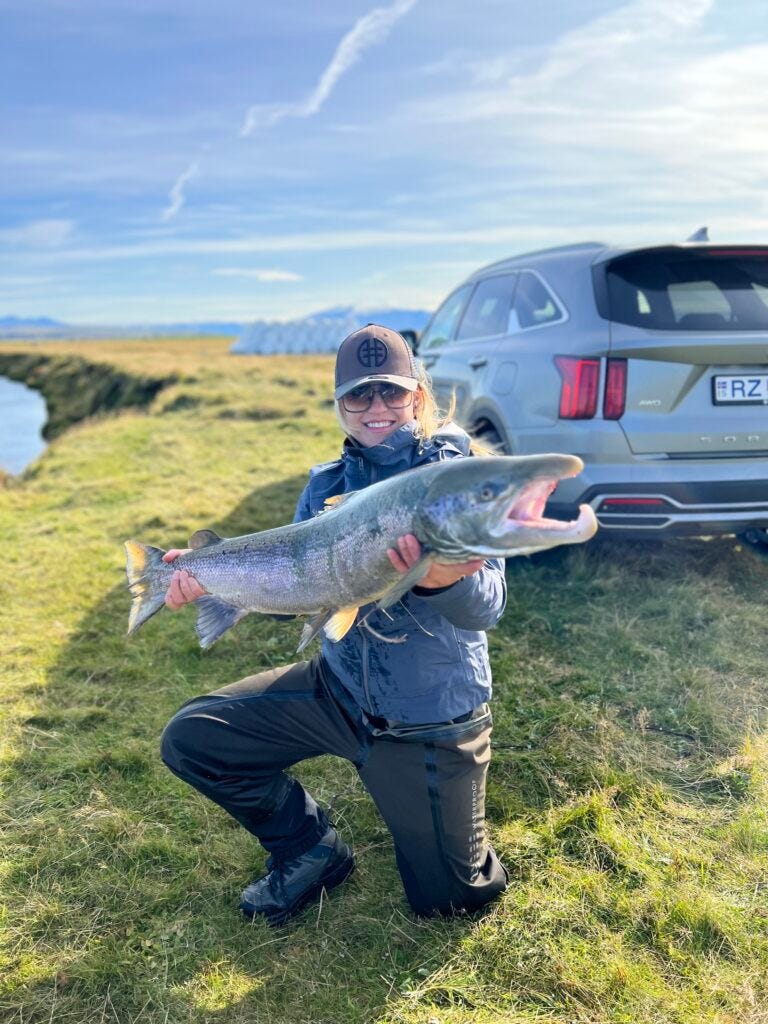Maddox And I Talk Edu, Lazy Achievement Takes, Lazy Reading, Plus Enormous Fish
Ibram Kendi's ideas aren't the problem, how our sector absorbed them is
Holland & Knight sponsors a podcast about Washington policy, regulatory and political issues. I sat down with Lauren Maddox to talk education. Lauren’s first question was about the Pan Mass Challenge and why I ride in it every year, which was a lovely way to start. (Fundraising ends tomorrow!) Then we covered a range of issues – including the follow-up question we want to hear when people say they’re going to “abolish” the Department of Education, why preference falsification is poisoning the education debate and what’s lost when dissent is forced underground, AI and education, Covid recovery in Virginia and more generally, and why we need more error and learning in education.
The H&K page is the best way to listen or read but also here:
There are bunch of other ways to listen including the podcast landing page, or you can open on Apple Podcasts, listen on YouTube or via LinkedIn, Twitter, Facebook, or Instagram.
In case you missed it yesterday’s post was this interview with IES Director Mark Schneider about education research.
Today in flat earth pandemic policy dialogue:
The Youngkin administration has consistently blamed learning losses in Virginia on the closure of schools during the pandemic and decisions by prior Boards of Education to lower cut scores on student assessments and change the state’s standards of school accreditation. Many Democrats and prior board members have defended those choices, noting that Virginia is one of many states to experience learning loss since the pandemic.
Once again, here’s federal data, ‘Joe Biden’s data’ if it makes you feel better:
And here’s a Democrat and prior (and current) board member on this exact “question”
As long as the media continues with this ‘one side says the moon is made of rock and the other says it’s made of green cheese so the debate over the lunar surface continues’ stuff the kids don’t stand a chance. We talked about this nonsense recently. There is plenty of room for reasonable and legitimate debate about the best remedies to this problem. The denial and obsfucation about the problem is beyond irresponsible at this point and when you do it you’re not damaging Glenn Youngkin politically, you’re hurting kids substantively.
The education world is flat:
Tyler Harper with a column in the Washington Post on Ibram X. Kendi’s problems at BU. Those problems aren’t a big surprise to anyone who paid attention to his run at AU – and that’s the problem, few in the education world did. There was a time when you couldn’t go anywhere without encountering Kendi or his “How to Be An Antiracist” book. And what was really wild is that while people went on about how “consciousness raising” the book was, when you’d ask about any specifics, or ideas like this straight out of Vonnegut or 1984, you’d get a blank stare. That was, of course, because much of the discourse wasn’t really about the book, but it made a great Zoom accessory and let people know you were one of the good guys.
That’s a problem. As we’ve discussed around here the education world has a tendency to flatten the discourse around race. The problem wasn’t Kendi specifically, it was that too many touting his ideas seemingly hadn’t encountered divergent ones or alternative ways to think about things. This was now the way to think. And I’m not talking about Chris Rufo. I mean Skip Gates, or Randall Kennedy or the Fields sisters, Thomas Sowell, or Touré Reed or Adolph Reed. Or popular writers in media. Interestingly, Kendi himself challenged some of the shibboleths of the DEI industry that was busily gobbling up parts of the education non-profit sector, but that level of discourse was not on offer. And whatever you think of Kendi’s book Stamped, or standardized testing, the parts about educational testing misstate aspects of that debate so it was odd for our sector celebrate all this so uncritically. (It was also an absolute dream for the teachers’ unions).
This same tendency, incidentally, is what has sadly left the College Board’s AP African-American history course suspect on the left and the right. Serious scholars who were neither white nor on the political right raised concerns about aspects of that course and were ignored with predictable results.
My point here is not who is right or wrong in any of this. If you want to go full on Kendi that’s fine. You’re a critic? That’s fine, too. Like or don’t like those others I just mentioned, great, whatever. I find the idea that every policy is either racist or anti-racist a dead end intellectually as soon as that method is applied to complicated real world examples. Your mileage may vary and debate and dissent is healthy and the path to progress. My point is that’s not how the “discourse,” which is far from a conversation or debate and incredibly insular, plays out in the elite education non-profit world. That has effects that are as predictable as they are unproductive to the mission of making education in America work better for young people or greater social and economic inclusion for Black Americans. Kendi’s ideas aren’t the problem. That is.
It’s Friday, I know why you are here, so here’s some fish porn from an Icelandic friend. This is Hrafnhildur, Habby is fine if, like me, Icelandic people cringe when you try out their language. Habby’s involved in education there with a company called KVAN that’s involved in educator development. She’s a great person and a badass on the water as you can see – these fish pull hard.
Iceland does some unique things on education and youth development. And it’s insanely beautiful and wonderful to visit.
Habby is our second Icelandic fish here, Tim Lee was first. All part of this unique archive of hundreds of pictures of education types with fish. Send me yours!





